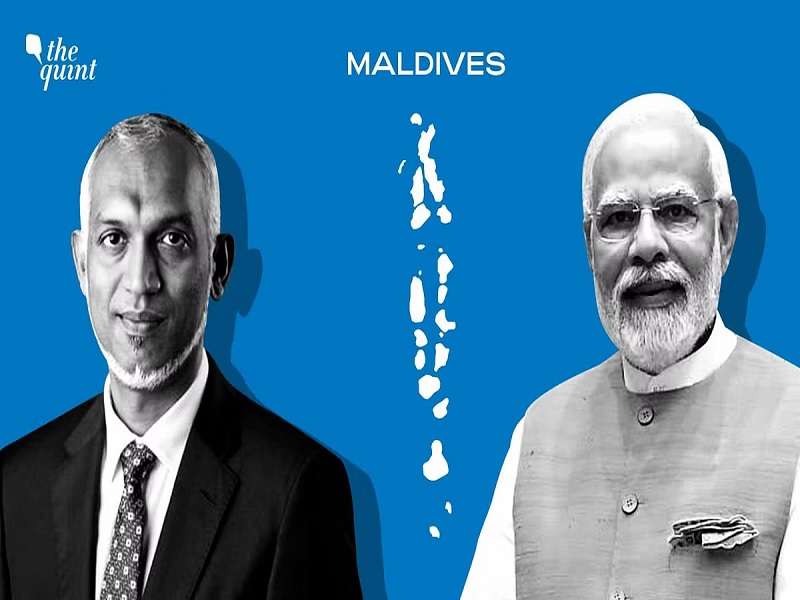Newly inaugurated Maldivian President Mohamed Muizzu came to power on an anti-Indian platform, but it was initially expected that he’d drop the demagoguery after entering office in favor of pragmatism due to his country’s close historical ties with its much larger neighbor. Even his request for India to withdraw its less than 100 servicemembers from the country, who were mostly carrying out maintenance and training activities, was thought to be nothing more than a symbolic nod to his base.
Subsequent developments have proven that he and his government are obsessed with spiting India and throw cold water on the hopes that he’ll practice a pragmatic policy towards that country. He bucked tradition by traveling to Turkiye instead of India as his first foreign visit, and although he met with Prime Minister Narendra Modi during the COP-28 Summit in the UAE, he’s visiting its Chinese rival next week and has yet to plan a trip to India. Even worse, a racist scandal has just toxified their ties.
A council member from the ruling party reacted to Prime Minister Modi’s trip to the union territory of Lakshadweep as part of his country’s “Vocal for Local” domestic tourist campaign by tweeting that: “The move is great. However, the idea of competing with us is delusional. How can they provide the service we offer? How can they be so clean? The permanent smell in the rooms will be the biggest downfall.” This was followed by two other ruling officials tweeting about the Indian premier’s trip.
The Deputy Minister of Youth Empowerment, Information and Arts wrote the following in a now-deleted tweet: “What a clown. The puppet of Israel Mr Narendra diver with a life jacket #VisitMaldives”, while her co-deputy was more diplomatic and said that India’s island tourism industry can’t compete with the Maldives’. These sequential tweets from ruling party officials prove that their administration perceives bilateral relations much differently than Prime Minister Modi’s.
Whereas the Indian leader’s administration formulates policy towards all with the intent of balancing each party’s objective national interests, including the Maldives’, that island nation’s leader and his team are driven by demagoguery to “decouple” their country from India despite the mutual costs. To that end, Muizzu is conspicuously ignoring India in his travel plans while visiting two countries with whom its ties have been complicated (Turkiye and China), not to mention last weekend’s racist scandal.
India gave him the benefit of the doubt by expecting that he’d adhere to the same pragmatic interests-driven paradigm of International Relations as it does, which is increasingly becoming the global norm, but it turns out that he and his team are anti-Indian ideologues obsessed with spiting that country. Upon realizing this, India’s strategic threat perception will increase, though it’s unlikely to overreact to the new Maldivian government’s growing number of provocations like they seem to want it to do.
By remaining cool, calm, and collected and continuing to formulate policy in advance of their country’s objective national interests instead of emotionally overreacting, international observers will see for themselves that Muizzu’s administration is pathologically obsessed with India. After all, India hasn’t done anything to deserve the scorn that it’s receiving from him and his team, and it reflects very poorly on its new leader that he hasn’t condemned last weekend’s racist scandal from a fellow party member.
India’s adversaries are obviously delighted at what’s happening since they plan to exploit his administration’s ideologically driven anti-Indian hatred to promote their interests at that country’s expense via whatever activities they might have planned for the Maldives. These intentions aren’t lost on Indian policymakers, who presumably already ordered relevant institutions to closely monitor associated developments, but it also doesn’t mean that India will overreact to them either.
More than anything, Muizzu wants India to make a scene about his spiting of that country and the other provocations that ruling party officials are participating in so that he can spin its reaction in a way that justifies the further acceleration of his “decoupling” policy, plus he wants to smear its reputation too. India’s newly troubled ties with the US and its continually difficult ones with China could lead to those two influencing the global media outlets under their sway to amplify any Indian overreaction to events.
Both have avoided informing their audience about the new Maldivian government’s anti-Indian obsession, instead misportraying him as a nationalist who’s simply channeling his country’s supposedly legitimate grievances, and each has their own interests right now in making India look bad. That’s why they’re expected to tacitly support his predictable abovementioned spin in the scenario that India overreacts to the latest developments or forthcoming provocations as they arise.
Muizzu is fast becoming a troublemaker, but at present, he’s unwilling to cross red lines in the Maldives’ relations with India such as by tangibly supporting Delhi-designated terrorists-separatists like those that Turkiye sympathizes with in Kashmir or inviting China to open up a naval base. If either of those happens, then India will surely defend its objective national interests, though it can only be speculated through what means. Hopefully Muizzu knows better than to risk the harsh consequences of that scenario.
